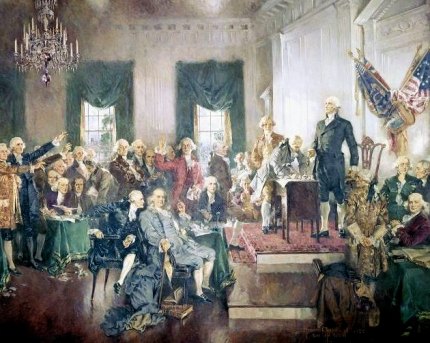Does it mean we should impeach a president who fails to pay parking fees, blasts rock music from the White House balcony at a volume that disturbs the neighbors or scampers out of the convenience store without paying for a soda? Or does it mean something else entirely?
During an interview on NBC's Meet the Press Sunday, Rep. Adam Schiff, D-Calif., made this observation: "The founders had a different idea of what misdemeanor meant. It's not a lesser crime, but it's misdemeaning in office."
The dust is beginning to clear. Here is the background, along with links and sources for further study:
A definition: Misdemean is defined by the Merriam-Webster online dictionary this way, "to behave (oneself) badly." The word misdemeanor is defined as a "crime less serious than a felony." A secondary definition is simply "a misdeed."
By way of background: When framing the U.S. Constitution, delegates wanted a set of checks and balances -- a system in which separate branches of government share power. James Madison, a delegate from Virginia, argued that an election every four years would not provide enough of a check on a president who abused power, recounts the Constitutional Rights Foundation online. "He contended that 'loss of capacity, or corruption . . . might be fatal to the republic' if the president could not be removed until the next election."
The concept of impeachment comes from British constitutional history, according to the website for the U.S. House of Representatives. "The process evolved from the 14th century as a way for parliament to hold the king’s ministers accountable for their public actions."
In the U.S., the constitution gives the House of Representatives the sole power to impeach an official. The Senate is the court for impeachment trials.
The grounds for impeachment: The constitution's framers agreed on the necessity of impeachment. Next they had to set parameters, the Constitutional Rights Foundation recounts. "One committee proposed the grounds be 'treason, bribery and corruption.' ”
Madison's fellow Virginian, George Mason, wanted to add the clunky word maladministration. "He thought that treason and bribery did not cover all the harm that a president might do," the foundation explains.
But Madison thought "maladministration" was vague enough that Congress could toss out any president with whom the members disagreed. Mason then suggested high crimes and misdemeanors, a phrase used by the English Parliament in its articles of impeachment since 1450, according to Smithsonian Magazine.
In England, high crimes and misdemeanors "had comprehended conduct not constituting indictable offenses," according to the Legal Information Institute at Cornell Law School. "Use of the word other to link high crimes and misdemeanors with 'treason' and 'bribery' is arguably indicative of the types and seriousness of conduct encompassed by high crimes and misdemeanors. Similarly, the word 'high' apparently carried with it a restrictive meaning."
So, how do we interpret high crimes and misdemeanors? The words treason and bribery are clear enough, writes Neil J. Kinkopf, William Nelson Cromwell Professor of Politics at Princeton University, on the National Constitution Center website. But the phrase “other high crimes and misdemeanors” is not at all clear. Not only that, the meaning of words can change from generation to generation. But that may be for the best.
"It is open-ended for the reason many constitutional provisions are vague and open-ended," Kinkopf explains. "The constitution cannot be expected to specify in detail every ground on which impeachment is or is not permissible. If it attempted to do so, an individual who should be impeached might evade this punishment because the officer’s conduct does not meet some technical element of the definition even though the officer’s conduct had so harmed the nation that all agree the officer should be removed."
Resources:
- Constitutional Rights Foundation: High Crimes and Misdemeanors.
- Encyclopedia Britannica.com: Checks and Balances, political science, by the editors of Encyclopedia Britannica.
- Legal Information Institute, Cornell Law School: Impeachable Offenses.
- Merriam-Webster online: Definitions of misdemean and misdemeanor.
- National Constitution Center: The Scope of the Impeachment Power -- What are High Crimes and Misdemeanors, by Neil J. Kinkopf, William Nelson Cromwell Professor of Politics at Princeton University.
- NBC's Meet the Press: Transcript, July 28, 2019.
- Smithsonian.com: Inside the Founding Fathers' Debate Over What Constituted an Impeachable Offense, by Erick Trickey.
- U.S. House of Representatives: Impeachment.
Related:
Three presidents and the price of scandal
The White House and the enemies list
Like us on Facebook and tell us what you think.
